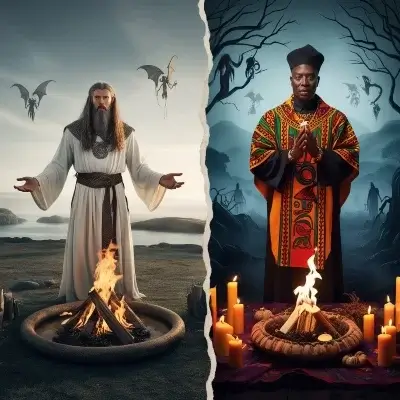When you think about Halloween and African American History, do you ever wonder about Zombies and Hoodoo or where the traditions we celebrate today come from? As we carve pumpkins, wear costumes, and talk about spirits and spooky things, it’s easy to forget the long, interesting history behind this holiday.
Halloween’s origins date back to the ancient Celtic festival of Samhain, a time to honor the dead and protect the living. But what’s even more surprising is how these customs are similar to African spiritual practices, like honoring ancestors and calling on spirits. Have you ever thought about how connected these traditions might be?
Let’s dive in and explore the powerful cultural roots of Halloween.
The Chilling History of the Zombie: From Haitian Vodou to Hollywood
One of the creepiest characters in Halloween stories is the ‘zombie’—a figure many people think of as a brain-eating monster. But the real story behind zombies comes from the dark history of ‘Haitian Vodou’ and the brutal reality of slavery.
Zombies didn’t start in Hollywood; they began in the ’17th and 18th centuries’ on the sugar plantations of ‘Saint-Domingue’ (modern-day Haiti), where African slaves were forced to work under terrible conditions. Many died within a few years due to the harsh treatment.
Imagine the hopelessness the slaves must have felt, trapped in this brutal life. The zombie myth symbolized their worst fear—a future where, even in death, they would remain enslaved.
In Haitian Vodou, zombies weren’t driven by a hunger for flesh but were cursed to be slaves forever, even after death. This reflected the horrors the slaves experienced daily.
The Role of Samhain: How Celts Celebrated the Supernatural
The story of Halloween’s origins goes back over 2,000 years to the ‘festival of ‘Samhain’, celebrated by the Celts in what are now Ireland, Scotland, and Wales. Around the 1st century BCE, the Celts believed that the boundary between the living and the dead became thin during Samhain, allowing spirits to walk the earth.
To protect themselves, they lit bonfires and wore costumes to blend in with these spirits. These ancient customs later evolved into today’s trick-or-treating.
During Samhain, the Celts also practiced divination, believing that this time allowed them to communicate with spirits and see into the future. This is similar to the spiritual practices in Hoodoo and Voodoo, where people called upon spirits for guidance and protection. These ancient traditions highlight the human desire to connect with the supernatural during uncertain times.
Halloween’s African Roots: The Untold Story in African American History
When we think about Halloween and African American history, we rarely consider how deeply intertwined they are. Isn’t it strange that Halloween is viewed as an American holiday, despite its strong connections to African spiritual practices?
In many African cultures, practices like juju or muti are met with fear and skepticism. Just imagine how those societies might react to people dressed as witches and ghosts, knocking on doors for candy—it’d be quite a sight!
If Halloween’s African roots were more widely known, would we celebrate it differently? Today, it’s all about costumes, candy, and fun, but it originally involved ancestor veneration and the connection between the living and the dead.
While commercialization has buried this deeper meaning, the African roots of Halloween and its ties to African American history are still there.
Rediscovering the Cultural Roots of Halloween
In the end, the African roots of Hoodoo, Voodoo, and the zombie myth provide a deeper understanding of Halloween and African American history’s connection to the supernatural. From its origins with the Celtic Samhain festival to its evolution through African spiritual systems brought to the Americas during slavery, these elements shape our modern Halloween celebrations.
Halloween is much more than spooky fun. While many of these connections have been forgotten or commercialized, they remain an essential part of the holiday’s deep and tangled history.
Discover more about the Celtic Roots of Halloween

